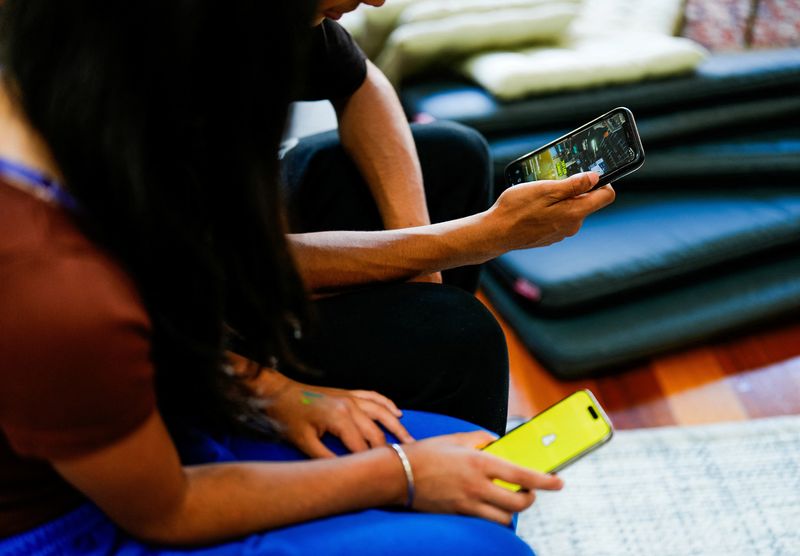PARIS (Reuters) – Australia has accepted a social media ban for youngsters aged beneath 16, one of many world’s hardest rules focusing on Huge Tech. Here’s what Australia, European nations, and tech firms have been doing to manage kids’s entry to social media.
AUSTRALIA
The brand new regulation forces tech giants from Instagram and Fb (NASDAQ:) proprietor Meta to TikTok to cease minors logging in or face fines of as much as A$49.5 million ($32 million). A trial of strategies to implement it can begin in January, with the ban to take impact in a yr.
TECH’S OWN REGULATION
Social media platforms together with TikTok, Fb and Snapchat say individuals must be at the very least 13 to enroll. Baby safety advocates say management is inadequate, nevertheless, and official knowledge in a number of European nations present large numbers of kids beneath 13 have social media accounts.
BRITAIN
Britain has no present plans for Australia-style restrictions. However digital minister Peter Kyle has stated that every little thing is on the desk in terms of holding individuals protected on-line and has launched a research to discover the influence of smartphone and social media use particularly on kids.
He stated that regulator Ofcom will need to have regard to authorities priorities resembling security by design and transparency and accountability, as they implement the On-line Security Act from subsequent yr.
The act, which units more durable requirements for social media platforms resembling Fb, YouTube and TikTok – together with on acceptable age restrictions – was handed in 2023 by the earlier authorities.
NORWAY
The Norwegian authorities final month proposed elevating the age at which kids can consent to the phrases required to make use of social media to fifteen years from 13 years presently, though mother and father would nonetheless be permitted to log off on their behalf if they’re beneath the age restrict.
The centre-left authorities additionally stated it had begun work on laws to set an absolute authorized minimal age restrict for social media use, but it surely was not instantly clear when a regulation mandating this will likely attain parliament.
Half of Norway’s nine-year-olds use some type of social media, in line with the federal government.
EU LEGISLATION
Within the European Union, parental consent is required for the processing of non-public knowledge for youngsters beneath the age of 16, although the bloc’s 27 member states can decrease that restrict to 13.
FRANCE
In 2023, France handed a regulation requiring social platforms to acquire parental consent for minors beneath 15 to create accounts. Nonetheless, native media say technical challenges imply it has not but enforced.
In April, a panel commissioned by President Emmanuel Macron really useful stricter guidelines, together with banning cellphones for youngsters beneath 11 and internet-enabled telephones for these beneath 13. It’s unclear when new laws could possibly be adopted and to what extent it might comply with the specialists’ suggestions.
GERMANY
Formally, minors between the ages of 13 and 16 are allowed to make use of social media in Germany provided that their mother and father give consent. There are presently no plans to go additional. Nonetheless, little one safety advocates say controls are inadequate and name for current guidelines to be higher applied.
BELGIUM
In 2018, Belgium enacted a regulation requiring kids to be at the very least 13 years outdated to create a social media account with out parental permission.
NETHERLANDS
Whereas the Netherlands does not have any legal guidelines concerning a minimal age for social media use, the federal government did ban cellular gadgets in lecture rooms from January 2024 to cut back distractions. Exceptions apply for digital classes, medical wants or disabilities.

ITALY
In Italy, kids beneath the age of 14 want parental consent to enroll in social media accounts, whereas no consent is required from that age upwards.




